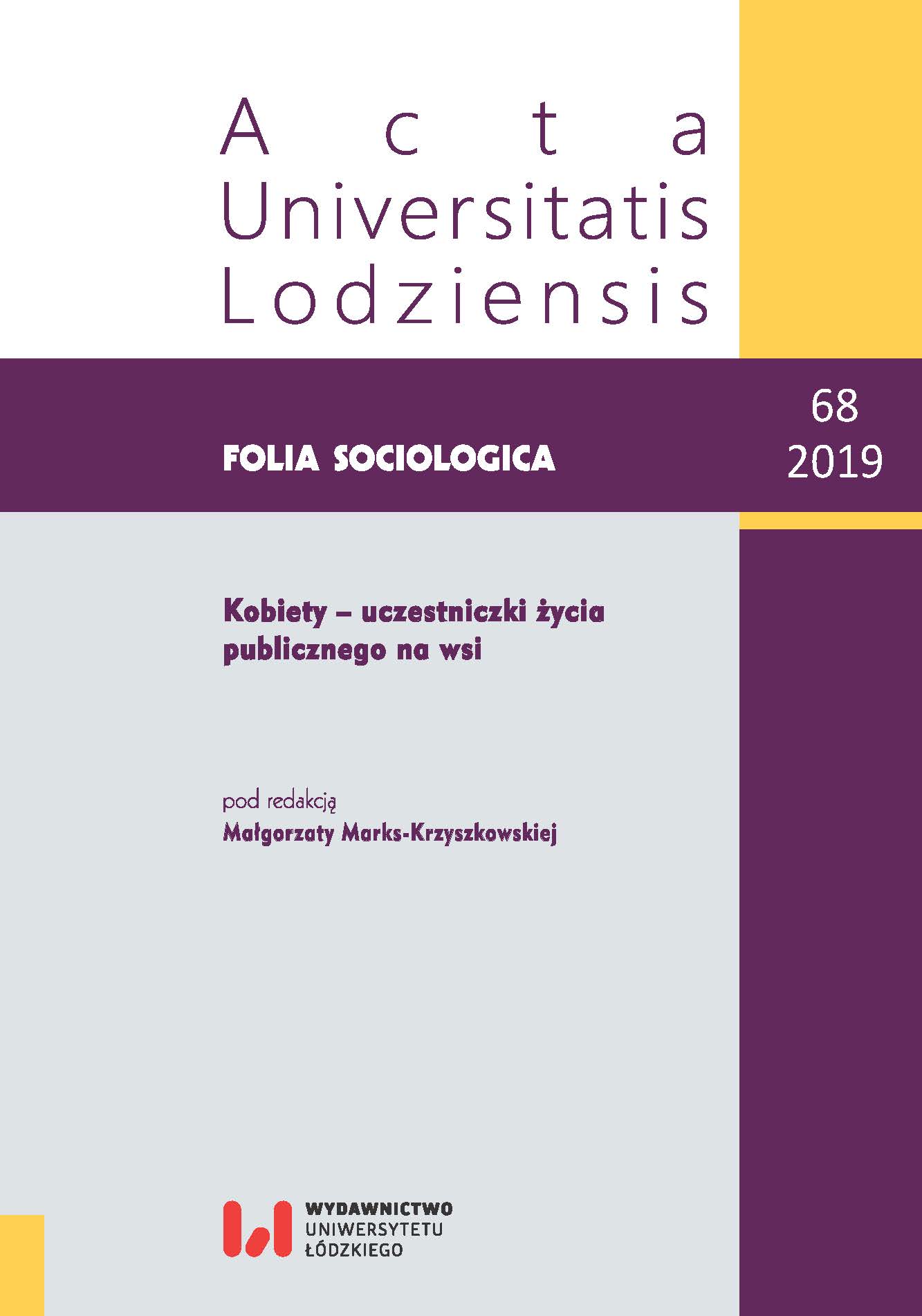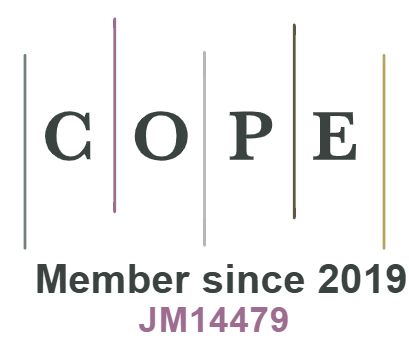Idea współzarządzania – szansa czy ograniczenie uczestnictwa publicznego kobiet na wsi
DOI:
https://doi.org/10.18778/0208-600X.68.06Słowa kluczowe:
kobiety na wsi, uczestnictwo publiczne, współzarządzanieAbstrakt
Celem artykułu jest znalezienie odpowiedzi na pytanie o to, czy realizowana na obszarach wiejskich koncepcja współzarządzania (tzw. new rural governance) umożliwia, tradycyjnie marginalizowanym w sferze publicznej, kobietom udział we współzarządzaniu gminą. Rozważania opierają się na przeglądzie międzynarodowej literatury przedmiotu i koncentrują się na określeniu zakresu uczestnictwa w szeroko rozumianym współzarządzaniu gminą i ewentualnych przyczyn jego ograniczeń. Jak wynika z analiz, mimo że zakres partycypacji kobiet we współzarządzaniu gminą nominalnie zwiększa się, to realnie często jest ograniczony do uczestnictwa bez możliwości wpływu na decyzje i nierzadko ma fasadowy charakter.
Bibliografia
Bock B. B. (2004), It Still Matters Where You Live: Rural women’s employment throughout Europe, [w:] H. Buller, K. Hoggart (eds.), Women in the European Countryside, Ashgate, Aldershot, s. 14–41.
Google Scholar
Bock B. B. (2006), Introduction: Rural gender studies in North and South, [w:] B. B. Bock, S. Shortall (eds.), Rural Gender Relations: Issues and case-studies, CABI, Oxfordshire, s. 1–18.
Google Scholar
Bock B. B. (2010), Personal and Social Development of Women in Rural Areas of Europe, European Parliament.
Google Scholar
Bock B. B. (2015), Gender Mainstreaming and Rural Development Policy: The Trivialisation of Rural Gender Issues, „Gender, Place & Culture”, nr 22 (5), s. 731–745.
Google Scholar
Bock B. B., Derkzen P. (2006), Gender and Rural Development Budgets, [w:] B. B. Bock, S. Shortall (eds.), Rural Gender Relations: Issues and case-studies, CABI, Oxfordshire, s. 224–241.
Google Scholar
DOI: https://doi.org/10.1079/9780851990309.0224
Bock B. B., Derkzen P. (2007), Barriers to Women’s Participation in Rural Policy Making, [w:] I. Asztalos Morell, B. B. Bock (eds.), Gender Regimes, Citizen Participation and Rural Restructuring, Elsevier, Amsterdam, s. 265–283.
Google Scholar
DOI: https://doi.org/10.1016/S1057-1922(07)13011-0
Cheshire L., Higgins V., Lawrence G. (eds.) (2006), Rural Governance: International perspectives, Routledge.
Google Scholar
DOI: https://doi.org/10.4324/9780203968178
Desperak I. (2008), Gmina jako środowisko społeczno-politycznej aktywności kobiet wiejskich, [w:] J. Krzyszkowski (red.), Diagnoza sytuacji społeczno-zawodowej kobiet wiejskich w Polsce, Warszawa, s. 107–124.
Google Scholar
Dryzek J. S. (2002), Deliberative democracy and beyond: Liberals, critics, contestations, Oxford University Press on Demand.
Google Scholar
DOI: https://doi.org/10.1093/019925043X.001.0001
Edwards B., Goodwin M., Pemberton S., Woods M. (2001), Partnership, Power and Scale in Rural Governance, „Environment and Planning C: Government and Policy”, nr 19 (2), s. 289–310.
Google Scholar
Eversole M. J. (2005), Introduction: Participation and governance in regional development, [w:] R. Eversole, J. Martin (eds.), Participation and Governance in Regional Development. Global trends in an Australian context, Ashgate, Aldershot, s. 1–14.
Google Scholar
Goodwin M. (1998), The Governance of Rural Areas: Some emerging research issues and agendas, „Journal of Rural Studies”, nr 14 (1), s. 5–12.
Google Scholar
Gorlach K., Drąg Z. (2019), Rolniczki jako uczestniczki życia społecznego, „Acta Universitatis Lodziensis. Folia Sociologica”, nr 68, s. 47–66.
Google Scholar
DOI: https://doi.org/10.18778/0208-600X.68.04
Grant J., Rainnie A. (2005), The Hidden Role of Gender Exclusion in Regional Development Agencies, [w:] R. Eversole, J. Martin (eds.), Participation and Governance in Regional Development, Ashgate, Oxenbridge, s. 211–228.
Google Scholar
Herbert-Cheshire L., Higgins V. (2004), From Risky to Responsible: Expert Knowledge and the Governing of Community-Led Rural Development, „Journal of Rural Studies”, nr 20 (3), s. 289–302.
Google Scholar
Kawczyńska-Butrym Z. (2019), Kobiety – mieszkanki wsi – aktywność i zmiana, „Acta Universitatis Lodziensis. Folia Sociologica”, nr 68, s. 5–15.
Google Scholar
DOI: https://doi.org/10.18778/0208-600X.68.01
Little J. (2001), New Rural Governance?, „Progress in Human Geography”, nr 25 (1), s. 97–102.
Google Scholar
Little J. (2002), Gender and Rural Geography, Pearson, Essex.
Google Scholar
DOI: https://doi.org/10.1016/B0-08-043076-7/02601-2
Little J., Austin P. (1996), Women and the Rural Idyll, „Journal of Rural Studies”, nr 12 (2), s. 101–111.
Google Scholar
Little J., Jones O. (2000), Masculinity, Gender and Rural Policy, „Rural Sociology”, nr 65 (4), s. 621–639.
Google Scholar
Little J., Panelli R. (2003), Gender Research in Rural Geography, „Gender, Place and Culture: A Journal of Feminist Geography”, nr 10 (3), s. 281–289.
Google Scholar
Malinowska E. (1998), Pozycja społeczna kobiet wiejskich, „Przegląd Socjologiczny”, nr 47 (2).
Google Scholar
Murdoch J., Abram S. (1998), Defining the Limits of Community Governance, „Journal of Rural Studies”, nr 14 (1), s. 41–50.
Google Scholar
O’Toole K., Macgarvey A. (2003), Rural Women and Local Economic Development in South-West Victoria, „Journal of Rural Studies”, nr 19 (2), s. 173–186.
Google Scholar
Oedl-Wieser T. (2006), Frauen und Politik am Land, „Public Observer”, nr 33, s. 2–3.
Google Scholar
Oedl-Wieser T. (2015), Gender Equality: A core dimension in Rural Development Programmes in Austria?, „Gender, Place & Culture”, nr 22 (5), s. 685–699.
Google Scholar
Offe C. (2012), Governance – „puste pojęcie” czy naukowy problem badawczy?, „Zarządzanie Publiczne”, nr 3 (21), s. 81–107.
Google Scholar
Panelli R., Pini B. (2005), “This Beats a Cake Stall!”: Farm women’s shifting encounters with the Australian state, „Policy & Politics”, nr 33 (3), s. 489–503.
Google Scholar
Pawłowska A. (2016), Governance jako podejście teoretyczne – kilka kwestii spornych, „Polityka i Społeczeństwo”, nr 3 (14), s. 5–17.
Google Scholar
Pięta-Szawara A. (2019), Milcząca nieobecność. Uczestnictwo polityczne kobiet na obszarach wiejskich, „Acta Universitatis Lodziensis. Folia Sociologica”, nr 68, 17–31.
Google Scholar
DOI: https://doi.org/10.18778/0208-600X.68.02
Pini B. (2006), A Critique of ‘New’ Rural Local Governance: The case of gender in a rural Australian setting’ „Journal of Rural Studies”, nr 22 (4), s. 396–408.
Google Scholar
Pini B., McDonald P. (2013) (eds.), Women and Representation in Local Government: International case studies, Routledge, London.
Google Scholar
DOI: https://doi.org/10.4324/9780203829424
Rhodes R. A. (1997), Understanding Governance: Policy networks, governance, reflexivity and accountability, Open University Press.
Google Scholar
Rhodes R. A. (2007), Understanding Governance: Ten years on, „Organization Studies”, nr 28 (8), s. 1243–1264.
Google Scholar
Rhodes R. A. W. (1996), The New Governance: Governing without government. „Political Studies”, nr 44 (4), s. 652–667.
Google Scholar
DOI: https://doi.org/10.1111/j.1467-9248.1996.tb01747.x
Sheridan A., Pini B., Conway L. (2006), Modestly Staffed and Modestly Resourced: An Exploratory Critique of Women’s Entry to Rural and Regional Governance, „Rural Society”, nr 16 (3), s. 271–282.
Google Scholar
Shortall S. (2002), Gendered Agricultural and Rural Restructuring: A case study of Northern Ireland, “Sociologia Ruralis”, nr 42 (2), s. 160–176.
Google Scholar
Shortall S. (2006), Gender and Farming: An overview, [w:] B. B. Bock, S. Shortall (eds.), Rural Gender Relations: Issues and case studies, CABI, Oxfordshire, s. 19–26.
Google Scholar
Shortall S., Bock B. B. (2015), Introduction. Rural Women in Europe: The impact of place and culture on gender mainstreaming the European Rural Development Programme, „Gender, Place & Culture”, nr 22 (5), s. 662–669.
Google Scholar
DOI: https://doi.org/10.2307/j.ctvrdf2qs.4
Stoker G. (1998), Governance as Theory: Five Propositions, „International Social Science Journal”, nr 50 (155), s. 17–28.
Google Scholar
Thuesen A. (2016), Gender and Rural Governance, [w:] M. Shucksmith, D. L. Brown (eds.), Routledge International Handbook of Rural Studies, Routledge, Taylor & Francis eBooks, s. 379–388.
Google Scholar
Thuesen A. A., Derkzen P. (2016), Questioning the Gender Distribution in Danish LEADER LAGs, [w:] L. Grandberg, K. Anderson, I. Kovach (eds.), Evaluating the European Approach to Rural Development: Grass-roots Experiences of the LEADER Programme, s. 127–148.
Google Scholar
Tickell A., Peck J. (1996), The Return of the Manchester Men: Men’s Words and Men’s Deeds in the Remaking of the Local State, „Transactions of the Institute of British Geographers”, nr 21 (4), s. 595–616.
Google Scholar
Tryfan B. (1968), Pozycja społeczna kobiety wiejskiej, Książka i Wiedza, Warszawa.
Google Scholar
Walczak-Duraj D. (2008), Potencjał i specyfika kapitału społecznego kobiet funkcjonujących w środowisku wiejskim, „Przegląd Socjologiczny”, nr 57 (1), s. 105–134.
Google Scholar
Pobrania
Opublikowane
Jak cytować
Numer
Dział
Licencja

Utwór dostępny jest na licencji Creative Commons Uznanie autorstwa – Użycie niekomercyjne – Bez utworów zależnych 4.0 Międzynarodowe.










